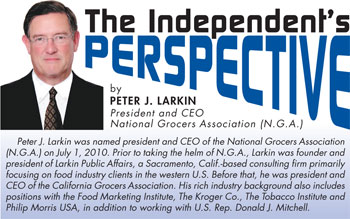Last updated on January 18th, 2013 at 11:01 am
 This month, negotiations in Congress continue to heat up as the massive and very influential 2012 Farm Bill is debated before Congress leaves town for the August recess and another round of campaigning. The Farm Bill, which authorizes proposed funding for five years and deals with a diverse array of policy topics such as agriculture, trade and, of utmost importance to N.G.A. members, the Supplemental Nutrition Assistance Program (SNAP), formerly known as the Food Stamp Program.
This month, negotiations in Congress continue to heat up as the massive and very influential 2012 Farm Bill is debated before Congress leaves town for the August recess and another round of campaigning. The Farm Bill, which authorizes proposed funding for five years and deals with a diverse array of policy topics such as agriculture, trade and, of utmost importance to N.G.A. members, the Supplemental Nutrition Assistance Program (SNAP), formerly known as the Food Stamp Program.
Though the Farm Bill directly affects farmers and commodity groups alike, the largest component of this legislation is SNAP. In the last Farm Bill, SNAP benefits totaled about $80 billion—more than 80 percent of the total bill spending.
As of this writing, the Senate Agriculture Committee has completed its work on the Farm Bill with the possibility of floor action this summer. Meanwhile, the House Agriculture Committee continues to work on its bill. Since the Great Recession of 2008, low-income and unemployed Americans now more than ever depend on SNAP as a temporary safety net, but as debt ceiling arguments loom in the House of Representatives, SNAP funding remains a contentious issue and one targeted for cuts.
In addition to SNAP funding concerns, N.G.A. is particularly concerned about potential legislative efforts that would limit choice by placing new restrictions on certain food items for SNAP recipients. Not only would such proposals add new administrative burdens on retailers, they would be a giant leap backwards in terms of removing the stigma many recipients faced in the days of paper food stamp coupons.
With more than 300,000 food and beverage products in the market and thousands of new products being introduced each and every year, it would be incredibly difficult to categorize what foods would be considered good/bad or healthy/unhealthy. For instance, let’s look at a granola bar: One that is rich with whole grain rolled oats and protein is healthy, right? Well, what about when you add chocolate chips to the granola bar? How does one draw the line between healthy and unhealthy in that case? Unfortunately, placing new restrictions on SNAP would likely lead to the creation of a new bureaucracy within USDA deciding what foods constitute as “good” or healthy and which foods should be considered “bad” or unhealthy, and it would fall to the grocery community to implement and police this new “list.”
Placing new restrictions on SNAP would impact grocers by adding new costs and administrative burdens to an already highly regulated, low-margin industry. Because of this, N.G.A. continues to meet with the offices of representatives and senators on Capitol Hill to educate them on the challenges grocers and our customers would face under potential restrictions. We are focused on ensuring SNAP restrictions do not get tacked on the Farm Bill as an amendment, which is a likely strategy particularly during an election year.
The likelihood of a Farm Bill being agreed upon by both chambers before the end of the year is becoming more questionable, especially as legislators gear up for their own elections and the Democratic and Republican National Conventions in Charlotte (starting Sept. 3) and Tampa Bay (starting Aug. 27). Despite the uncertainty that revolves around the Farm Bill, N.G.A. will continue to inform Congress how SNAP choice would negatively impact our industry and the millions of consumers we serve daily.
N.G.A. members recognize the SNAP program can always be improved and will continue to work with the USDA, Congress and industry partners to eliminate fraud, waste and improve efficiency within the program. We know that changes can be made to better the program, but restricting choice is not the answer. Instead, let’s work together to educate consumers on making better, more balanced choices. That is something we can all be proud of, while also continuing to provide an important service to those in need.





